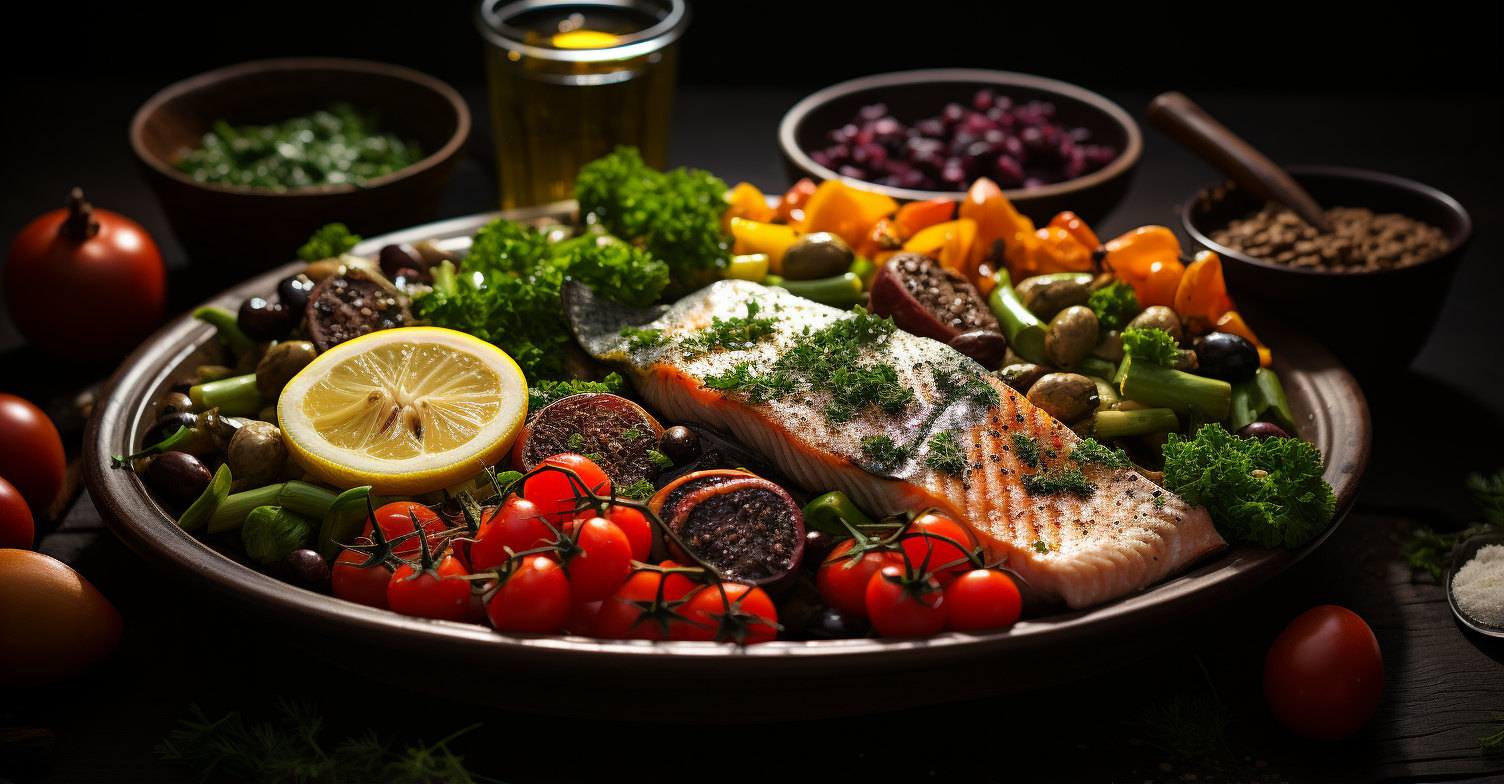In today’s fast-paced world, the importance of maintaining a balanced and sustainable diet cannot be overstated. Healthy diet plans are more than just a trend; they’re a necessity for long-term health and well-being. Recent statistics show that individuals who follow a balanced diet are 20% less likely to suffer from chronic diseases.
Understanding the Importance of Diet Choices
Let’s face it, we’ve all been there: standing in front of the fridge, contemplating whether to grab that leftover pizza or opt for a salad. But here’s the kicker: our diet choices go beyond just satisfying our taste buds.
| Diet Type | Description | Main Emphasis | Health Benefits |
|---|---|---|---|
| Mediterranean Diet | Traditional foods, rich in fruits, vegetables, and olive oil | Heart health, longevity | Reduced risk of heart disease, increased life expectancy |
| DASH Diet | Dietary Approaches to Stop Hypertension | Low sodium, high fruits & veggies | Lowered blood pressure, reduced heart disease risk |
| Plant-Based Diets | Vegetarianism, veganism, flexitarianism | Plant-based, reduced animal products | Reduced risk of chronic diseases, weight loss, sustainability |
| MIND Diet | A fusion of Mediterranean and DASH diets | Brain health, cognitive benefits | Reduced risk of Alzheimer’s, improved cognition, potential Parkinson’s prevention |
| Intermittent Fasting | Time-based eating methods | Controlled fasting periods | Improved metabolism, anti-aging effects, insulin sensitivity |
Healthy diet plans play a pivotal role in our overall health. Think of it as the fuel for our body’s engine. The better the fuel, the smoother the ride.
Different diets cater to various health goals. While some might be chasing weight loss dreams, others might be looking to build muscle or manage a health condition. It’s not a one-size-fits-all scenario.
And here’s a fun fact for you: According to the World Health Organization, a healthy diet can prevent up to 80% of premature heart disease and stroke cases. That’s right, 80%! The role of diet in disease prevention and longevity is monumental. So, the next time you’re about to indulge in that sugary treat, think twice!
The Mediterranean Diet: A Gold Standard
Ah, the Mediterranean! Sun, sea, and… superfoods? That’s right! The Mediterranean diet, originating from countries bordering the Mediterranean Sea, is often hailed as the gold standard of diets. And it’s not just because of the delicious olives.
This diet emphasizes the consumption of traditional foods like vegetables, fruits, whole grains, fish, nuts, lentils, and the ever-so-luxurious olive oil. Picture this: a plate bursting with colors, flavors, and nutrients.
But it’s not just about tantalizing your taste buds. The health benefits of the Mediterranean diet are profound. Studies have shown that it can lead to a reduced risk of chronic diseases like heart disease and diabetes. And if that wasn’t enough, it’s also linked to increased life expectancy. Who knew living longer could taste so good?
And for those of you who are curious to dive deeper into the world of healthy diets, here’s a fantastic read on the best diet plans that you might find intriguing.

The DASH Diet: Combatting Hypertension
Ever heard of the saying, “You are what you eat”? Well, when it comes to high blood pressure, this couldn’t be truer. Enter the DASH diet, a superhero in the world of healthy diet plans. Its mission? To combat hypertension, one meal at a time.
| Food Group | Examples | Recommended Intake |
|---|---|---|
| Fruits | Berries, apples, oranges | 4-5 servings/day |
| Vegetables | Spinach, broccoli, carrots | 4-5 servings/day |
| Whole Grains | Brown rice, oats, quinoa | 6-8 servings/day |
| Lean Meats | Chicken, turkey, fish | 2 or fewer servings/day |
| Salt Intake | Table salt, processed foods | Limited (1500-2300 mg/day) |
| Red Meat | Beef, pork, lamb | Occasional and in moderation |
The Purpose Behind the Plan
The DASH diet, which stands for Dietary Approaches to Stop Hypertension, is specifically designed to treat or prevent high blood pressure. It’s like a tailored suit for your health, fitting perfectly to combat those pesky BP numbers.
What’s on the Menu?
The DASH diet emphasizes:
- Fruits (think colorful berries and juicy melons)
- Vegetables (from leafy greens to crunchy carrots)
- Whole grains (goodbye, white bread!)
- Lean meats (hello, grilled chicken)
- Low salt intake (pass on that salt shaker)
- Limited red meat (occasional steak is okay, but moderation is key)
The Perks of Going DASH
The benefits are as clear as a summer’s day. By embracing the DASH diet, you can expect:
- A significant reduction in blood pressure (no more dreading those doctor visits!)
- Lowered risk factors for heart disease (your heart will thank you)
- Potential weight loss (a bonus for those looking to shed a few pounds)
For those eager beavers wanting to dive deeper into clean eating, check out this beginner’s guide.
Embracing Plant-Based Diets
In a world where meaty burgers and cheesy pizzas reign supreme, plant-based diets are the unsung heroes. They’re the Gandalf to our Frodo, guiding us on a journey to better health.

The Different Shades of Green
Plant-based diets come in various flavors:
| Diet Type | Description |
|---|---|
| Vegetarian | No meat, but dairy is allowed |
| Vegan | No animal products whatsoever |
| Flexitarian | Mostly plant-based with occasional meat |
The Green Benefits
Switching to a plant-based diet isn’t just a trend; it’s a lifestyle. And the benefits are aplenty:
- A significant reduction in the risk of chronic diseases (your future self will thank you)
- Potential weight loss (because who doesn’t love a good transformation story?)
- Environmental sustainability (Mother Earth gives it two thumbs up)
The Green Challenges
But, like all superheroes, plant-based diets have their kryptonite:
- Potential restrictions (goodbye, favorite cheese)
- Nutrient considerations (ensuring you get all the essential nutrients)
The MIND Diet: Focusing on Brain Health
Ever thought about feeding your brain? No, we’re not talking about late-night trivia games or Sudoku puzzles. We’re diving into the world of the MIND diet, where healthy diet plans meet brainpower.

A Fusion of the Best
The MIND diet is like the Avengers of diets, bringing together the best of the Mediterranean and DASH diets. Imagine a culinary dream team focused on boosting your brain health.
Brainy Ingredients
Key components of this diet include:
- Green leafy vegetables (Kale, anyone?)
- Berries (Blueberries for the win!)
- Beans (The magical fruit, or so they say)
- Olive oil (Liquid gold)
- Whole grains (Fiber-tactic)
- Fish (Brain food, literally)
- Poultry (Chicken or turkey, take your pick)
Why Go MIND?
The benefits are mind-blowing (pun intended):
- Reduced risk of Alzheimer’s disease (Because who wants to forget their favorite song?)
- Improved cognition (Sharper thinking, here we come!)
- Potential prevention of Parkinson’s disease (Another feather in its cap)
Blockchain and Cryptocurrency in Modern Diet Trends
Hold on to your hats, folks! We’re venturing into the unexpected crossroads of diets and digital currency.
Tech Meets Tastebuds
Ever wondered how technology shapes our food choices? Blockchain and cryptocurrency are not just for tech geeks; they’re influencing our food sourcing, transparency, and dietary choices. It’s like having a digital food detective at your fingertips.
The Future of Food
With blockchain, we can trace the journey of our food from farm to fork. And with cryptocurrency, imagine paying for your organic veggies using digital coins. The future is here, and it’s deliciously digital.
Intermittent Fasting: A Time-Based Approach
Skipping meals on purpose? Sounds crazy, right? But there’s a method to the madness, and it’s called intermittent fasting.
The Basics
There are a couple of popular methods:
- The 16/8 method (Fast for 16 hours, eat during an 8-hour window)
- The 5:2 method (Eat normally for 5 days, restrict calories for 2 days)
Why Fast?
The benefits are more than just weight loss:
- Improved metabolism (Burn, baby, burn!)
- Anti-aging effects (Who needs a fountain of youth?)
- Increased insulin sensitivity (A win for blood sugar levels)
For those looking to dive deeper into weight management, here’s a comprehensive guide on a 7-day diet plan for weight loss.
FAQ
What are the core components of healthy diet plans?
The core components typically include a mix of proteins, carbohydrates, fats, vitamins, and minerals. It’s essential to balance these nutrients for optimal health.
How does a balanced diet impact overall health?
A balanced diet provides the body with essential nutrients, leading to improved energy, better immune function, and reduced risk of chronic diseases.
Are all fats bad for health in healthy diet plans?
No, not all fats are bad. It’s crucial to differentiate between unsaturated fats (good fats) and saturated or trans fats (bad fats). Unsaturated fats, like those found in olive oil and fish, are beneficial for health.
How often should I change or modify my diet plan?
It’s advisable to review and adjust your diet every few months. However, always consult with a nutritionist or healthcare professional before making significant changes.
Can I include cheat days in my healthy diet plans?
Yes, occasional cheat days are acceptable. They can help maintain motivation and prevent feelings of deprivation. However, moderation is key.
How do I ensure my diet plan is sustainable in the long run?
To ensure sustainability:
- Prioritize foods you enjoy.
- Incorporate a variety of foods.
- Listen to your body’s hunger and fullness cues.
Are supplements necessary in healthy diet plans?
While supplements can be beneficial, they shouldn’t replace whole foods. It’s best to obtain nutrients from natural food sources, but if you have specific deficiencies, consult a doctor about supplements.
Conclusion
Embarking on a journey with healthy diet plans is a commitment to your well-being. As we’ve explored, the benefits of a balanced and sustainable diet are manifold, from boosting energy levels to warding off chronic diseases. As you move forward, remember that the path to optimal health is a marathon, not a sprint. Stay informed, listen to your body, and seek expert advice when needed.

